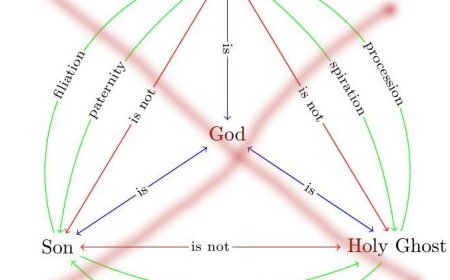What Jesus Says About Tithing
Let us address the biggest untruth that any false preacher has ever told; that when Jesus was here on earth He was rich. Jesus was not rich when He walked the earth.

Let us address the biggest untruth that any false preacher has ever told; that when Jesus was here on earth He was rich. Jesus was not rich when He walked the earth. The reason preachers tell people this is that Christianity means Christ-like, and Christians strive to be like Jesus, so preachers say this to get people to start thinking about how to get rich, as they claim Jesus was.
As an example to the flock, the preacher must be a product of his own testimony, so he creates and sells audio and videotapes, and books about how an average believer can inherit the riches of Christ. While the congregation consumes these goods, the preacher gets rich. People never stop to think about what is going on, how the preacher is actually getting rich by selling them things on getting rich, not because God is prospering the preacher with a heavenly inheritance.
We as Christians are rich in righteousness and heavenly fruit, not monetary wealth. A desire to be rich will consume the soul in unnecessary lusts that destroy righteousness and heavenly fruit and with a little spin on biblical concepts and the added touch of the Malachi Theory (will a man rob God); the preacher guarantees his opportunity to be rich. The strategy is like a neighborhood bully's hustle.
Many people seek riches in today's society and many will compromise morals for money, and there will always be crafty villains who will capitalize on that compromise. The sad thing is that the compromise is going on in churches and church leaders are the villains.
The theory of Jesus being rich is taken from the scripture of 2 Corinthians 8:9, among many other implied scriptures, which reads, "For ye know the grace of our Lord Jesus Christ, that, though he was rich, yet for your sakes he became poor, that ye through his poverty might be rich." The riches the scripture refer to are spiritual riches not material substances: spiritual riches of glory and honor and righteousness, all attributes of God's kingdom. What need would anyone have of material things in heaven?
In heaven, the bible says the streets are made of gold, the gates are laid in rubies and valuable jewels, and the crowns are made of silver and or gold, but none of these things are used to profit of the other, like it is used in this world; therefore, material substances have no real value compared to the riches of heaven. If people believe monetary things has meaning or value in heaven, then they live in a conceited and materialistic fantasy world.
The Lord desires that His children be rich in the qualities of heavenly riches, where the physical has no value. He did not send His Son, Jesus, to earth to die on the cross to make us rich with substances of the earth: that is a lie and contrary to scripture. "Lay not up for yourselves treasures upon earth, where moth and rust doth corrupt, and where thieves break through and steal: But lay up for yourselves treasures in heaven, where neither moth nor rust doth corrupt, and where thieves do not break though nor steal" (Matt. 6:19, 20).
The reason preachers teach Christian prosperity on earth is no mystery: it justifies their earthly greed. They stress the deed of tithing constantly because they claim to want to see God's people prosper, but the truth is ten percent of each individual member's monthly earnings from a 10,000 or so member congregation secures the church prosperity and the preacher's, and that is the underlying motive. From time to time, preachers will teach other topics as marriage, faith or family, but again, these topics also have an underlying motive that usually leads up to money.
Jesus walked the earth from city to city preaching righteousness and never asked anyone for a dime. He told the disciples "Provide neither gold, nor silver, nor brass in your purses" (Matt. 10:9). He was instructing them to not be concerned about money, but about preaching the gospel. The purpose of the gospel has nothing to do with money, but salvation: not prosperity, but perfection.
Jesus never asked for tithes from the multitudes, He never took up offerings in the synagogues; He never said anything about being under a curse if people did not pay tithes. One of the disciples would have recorded a New Testament commandment on tithes if Jesus had stressed tithe paying, but He did not. Jesus never wore expensive robes, jewelry, rode in any beautiful carriages, or owned anything of real value that brought relevance to the gospel.
He did not cease to teach against seeking for riches and glory or any of the things of the world. He spoke against fame and fortune and told the disciples that the world would hate them, and would not love them. He fed the multitudes with food of the physical and spiritual nature, and He never charged them money or suggested they give an offering to God for what He taught them. However, this is what today's preachers do.
Another parable that denounces the search for riches and money is in St. Mark chapter 12 vv. 41-44, called the widow's mite. In this parable, Jesus showed that the amount of the widow's offering to the church, which was only two mites, had no heavenly value, but because it was giving her all that won her honor with God. Though others gave more money than the widow did, they gave only a portion of their earnings, which is the concept of tithes, and not all of their earnings.
What the widow did was more acceptable with God than what the others did. The moral of this parable is, the sincerity of a person's commitment to God is counted by what they have to sacrifice, not how much they have. It also proves that God does not care about how much goes into the offering plate, whether a tenth, a fifth, or a twentieth of the giver's earnings, but whatever goes in must come from the heart, and whenever it is financially handy or reasonably logical for the giver.
The parable of the rich fool in St. Luke 12:16-21, is another that talks against the riches of the earth. The rich man's wealth increased abundantly throughout his life to where he was resolved what to do with the riches. His most logical conclusion was to build a bigger barn to store his goods, and then he would lay back and relax the rest of his life, (live off the interest so-called). Not to imply that saving and maybe investing is wrong, but people must make provisions for each aspect of life, which includes the salvation of the soul.
The rich man never considered what would become of his soul on the night he was to die, nor did he think about what would happen to his goods afterward. Many people in the world would leave their estate to heirs, so the heirs can carry the burden. Nevertheless, Jesus said that it is not wise to "Layeth up treasure for himself, and is not rich toward God" (v. 21). How does a person become rich toward God? They seek after the things of God, which are spiritual.
The parable of the hidden treasure in St. Matthew 13:44 is about a man who stumbles upon the treasures of heaven in a field and hides them for himself, then he goes and sells all that is of earthly wealth to him and buys the field. The man counted the riches of the earth nothing compared to the riches of heaven.
This mentality is what Jesus tries to relay to believers, to not trust in and depend on the treasures of earth but instead the treasures of heaven. Yet, preachers are not teaching this mentality to believers today, they are teaching them to seek the treasures of heaven in material form here on earth.
A deceptive spirit is affecting the church today that suggests a change of plans according to Jesus, which is; no more does He want believers to wait for heaven to get the treasures of heaven, but He will give believers the treasures of heaven in the form of earthly riches, and people believe this spirit. Believers must remember that "Jesus Christ the same yesterday, and to day, and for ever" (Heb. 13:8). He has not changed.
The parable of the goodly pearl in St. Matthew 13:45, 46 teaches the same as the parable of the hidden treasure, however, in this one, the man found a great pearl, instead of treasures, and sold all that he had to buy the pearl. Preachers take these two parables and twist the meanings: they teach that the moral of the parables is that in order to get the treasures of heaven believers must give all their material things, including earnings, to God, or at least to the one who represents God, which is the preacher. Yet, the preacher's definition of the riches of heaven means material things, not spiritual.
The parables' meaning of the riches of heaven means spiritual things, not material. Preachers convince believers that the riches of heaven are the material things of earth, that is, if the believer wants the riches of heaven in earthly form. However, the parables do not confirm the message in the preacher's perspective because it is not a literal theme, it is the essence of a mentality, which confirms the essence of heaven and not earth.
Because the parables use riches and treasures as illustrations, preachers take it to the literal realm to justify their lust for material goods, riches, and wealth, and because this spirit has infected society and the church, people believe in the literal and choose not the spiritual.
The parable of the Prodigal Son in St. Luke 15:11-32 is a beautiful illustration of the spirit that encourages believers to get treasures of heaven here on earth. The son asked his wealthy father for his share of the inheritance then left home and spent it all on riotous living, women, and excess of wine. When he hit rock bottom and came to his senses he returned home. His father forgave him and gave the son another inheritance simply because his father felt the son learned a valuable lesson.
The lesson was that the son never had to ask for his share of the inheritance in the first place, all he had to do was live and be content, but the son's longing for the substances and pleasures of the world overtook him and he wasted his inheritance until he came to shame.
Many people do not realize that when asking God for their share of the inheritance in the earthly form of material goods and so-called blessings of God that they are asking amiss and in covetousness, also because the pastor has convinced them to get what is theirs. If given the chance to have all that God grants in one lump sum could be dangerous because the deceitfulness of riches choke and destroy the goodness of the heart.
Countless parables of the New Testament plainly condemn the pursuance of money and today's pastors choose to ignore those parables. The reason people continue to follow misleading preachers is that people do not read their bibles, so they will never see or believe preachers are deceiving them.
The parables of Jesus Christ not only warn believers of falling into the mentality of the love of money, but also are lessons of how to gain and keep the riches of heaven, which are spiritual fruits of the heart and soul, not the pocket. Common sense must govern the followers of Christ concerning what things are destructive in the world. The love of money is one of the most destructive, so believers must know to be suspicious of a preacher who places great emphasis on money.
People are willing to believe that God wants to make them rich before He does anything to their soul when the scripture plainly says "But seek ye first the kingdom of God, and his righteousness; and all these things shall be added unto you" (Matt. 6:33). The righteousness of God comes first and during the believer's search for righteousness, He supplies the necessities of life and adds to the believer financial needs for the ministry.
Another scripture preachers use to heighten the lust for money is "Beloved, I wish above all things that thou mayest prosper and be in health, even as thy soul prospereth" (3 John 2). Preachers constantly twist this scripture out of proportion until there is no more substance, meaning, or credibleness to the scripture. The only reason they use this scripture is to convince people that God wants them to prosper, and it is true. This is what the scripture says and the Scriptures are true.
However, God no more gives prosperity than He does allow people to prosper. But what about the rest of the scripture, like good health? If the love of health was the root of all evil, and health influenced a person's status in society, preachers would be aerobic stars. Good health is in the scripture also and is what God desires for His people so what about the congregation's health? There are Old Testament ordinances for diet as are Old Testament ordinances for tithing, but preachers do not emphasize the ordinances of diet in their sermons. What profit would that bring?
There is no tithe for the sake of good health and a good diet alone will not get a soul into heaven. If a believer does not maintain a good diet or good health, is it a sin? No, but preachers do not teach this, although they teach the curse of tithes. What do the Scriptures say about eating fried foods and fatty foods?
What does the scripture say about too much sugar or too much grease and butter in food: things that kill the body? There is no church offering for the medical ministry nor do churches ordain men and women as ministers of health and fitness, (at least not as of yet) but they keep records of member tithes. Why focus on only one half of a scripture?
The Bible admonishes believers not to fall for these racketeering games of earthly riches. Follow righteousness, faith, and love, as the Bible says. Believers should never study and search the Scriptures for theories of obtaining money but search the Scriptures to obtain eternal life and prosperity will follow. Give only what is affordable at the time to the church and let God do the rest.
No preacher should ever burden believers with the guilt of sin and curses because they neglect or refuse to tithe to the church, but preachers must encourage believers to give what is affordable and financially convenient for the believer. "For if there be first a willing mind, it is accepted according to that a man hath, and not according to that he hath not" (2 Cor. 8:12).
Neither Jesus nor the apostles ever mention anything to the believers about tithing. They stressed and practiced giving. To give according to what he or she has or giving all that he or she has (to a trustworthy believer only) is necessary, but never a portion or a tenth. This is the mentality the Lord desires for His children to possess. Believers are under no biblical duty to contribute at all and preachers should not compel them to do so.
However, a believer should give to the church for the operation of the physical church building including utilities, food for gatherings, and other necessary things for everyday operation. Preachers insist that people are required to give, that it is mandatory of God and if they do not give money to the church then they are cursed. This is not the purpose of the gospel of Jesus Christ.
The scripture says, "Every man according as he purposeth in his heart, so let him give; not grudgingly, or of necessity: for God loveth a cheerful giver" (2 Cor. 9:7). This scripture confirms that believers are under no direct obligation or commandment to give anything to the church but what they have determined in their own heart to give. Preachers should never pressure believers to give money to the church, and believers should never feel they have to because they will then give grudgingly.
When preachers teach the above scripture they twist its meaning and interpret it thus: "a person should give according to what they have purposed in their heart but we all know that God requires a tenth, so in addition to the tenth, the person should give a little more." They add tithing in as if tithing is a given, but this is not true. The church of Jesus Christ does not have to tithe.
Preachers give believers no choice but to follow their lead, and right back into the commandments of the Law. No preacher will ever tell the believer to give only what they feel is right, but the preacher will always stress the deed of tithing along with a little extra from the goodness of the believer's heart. Many times, the preacher will ask for tithes, an offering, a love offering, a contribution for the building fund, a donation for the family in isle two, a gift offering for the couple engaged, and they ask all in the name of building the work of God and the church ministry.
There is no end to extortion for church money, and as believers grow in the righteousness and spirituality of God, they will see that there is no limit to how and on what bases the false prophet will solicit church members.













































